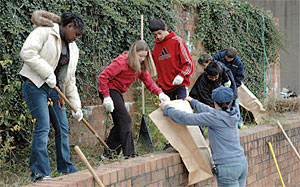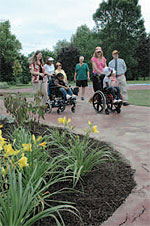WPC’s Green Spaces Enrich School Experiences
The Western Pennsylvania Conservancy’s School Grounds Greening Initiative has completed nearly three years of service to Pittsburgh Public Schools. The initiative’s goal is to increase healthy green spaces and landscapes available to students on school grounds for all 66 Pittsburgh Public Schools by the end of 2011.
Made possible through a $1.5 million grant from the Grable Foundation, the program has already completed 28 projects at schools that serve some 11,000 students. By the completion of the project, WPC will have reached approximately 29,000 students and close to 5,000 staff, as well as parents and community members of the surrounding neighborhoods.

South Hills Middle School students help with the removal of old foliage.
WPC utilizes sustainable landscape improvements (trees, shrubs and perennials) and constructs green spaces such as outdoor classrooms, sitting areas and natural play spaces. Studies show that bringing nature into the learning process encourages physical exercise, improves concentration, spurs creativity, instills a sense of peace and can reduce bullying, stimulate positive social interactions and enhance self-control. Community-wide effects can include increased school involvement and support from nearby community members, and a greener, healthier local environment.
Among the program’s 2010 highlights is the groundbreaking for a sensory garden that focuses on bringing the advantages of school greening to disabled students. The first of its kind in the Pittsburgh Public School district, WPC partnered with Pittsburgh Public Schools, the Grable Foundation and the Edith L. Trees Charitable Trust to make it possible.
The garden is located at the Pittsburgh Pioneer Education Center, a special education facility in the Brookline neighborhood that provides a range of services to students who have physical, mental and multiple disabilities.

Students and faculty at the Pioneer school enjoy their newly dedicated sensory garden.
The primary focus of this garden is to utilize plants that stimulate children through touch, scent, sound, color and texture as they enjoy the outdoor spaces created in the garden. Fragrance, texture, visual appeal and the rustling sound they make in the wind were high on the list of priorities for plant material selection. Several additional features such as a “bubbling” fountain, play panels, bird houses and outdoor musical instruments will be added.
“There has been an increasing body of research that shows the profound developmental, psychological and behavioral benefits of healthy and regular interaction with nature,” says David Wilson, WPC’s school grounds greening project coordinator.
To assure safety and sustainability, each school greening project is carefully planned through site assessments and feedback from schools. Trees and shrubs are planted in locations selected to maximize the environmental, visual and functional benefits for students with safety and sustainability in mind.
When possible, students are involved in greening their schools from the outset — in order to instill a sense of ownership and ensure the long-term care and maintenance of plants, trees and shrubs that beautify their schools. Volunteer “School Tenders” will also help sustain the schools’ green spaces. For more information about becoming a School Tender, call 412-586-2416 or email SchoolGreening@paconserve.org.
Get Involved
You can help WPC by volunteering your time! Click here to learn more.
